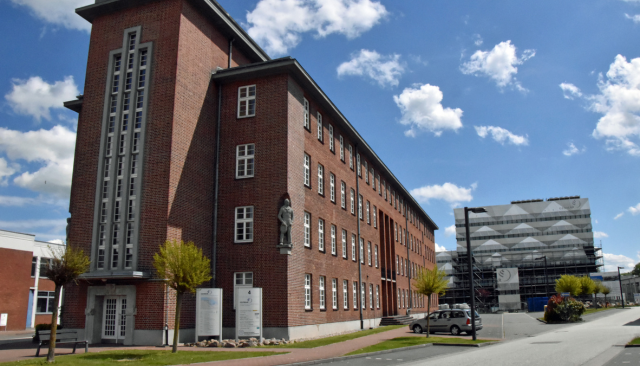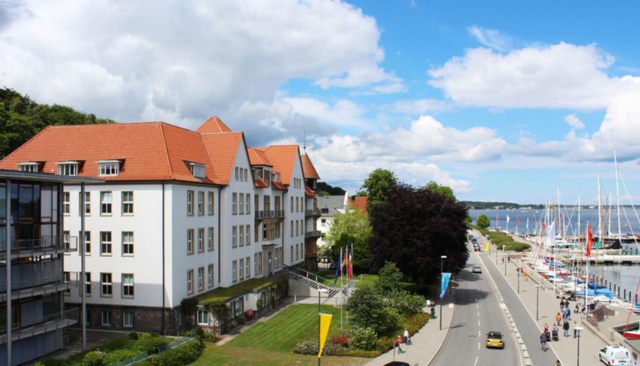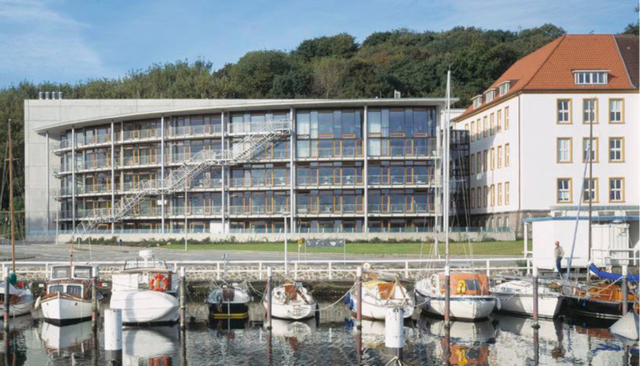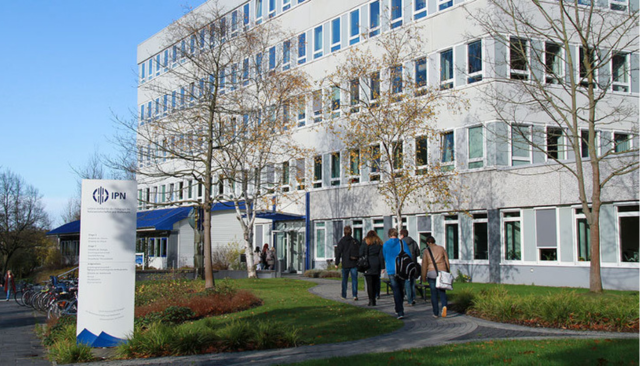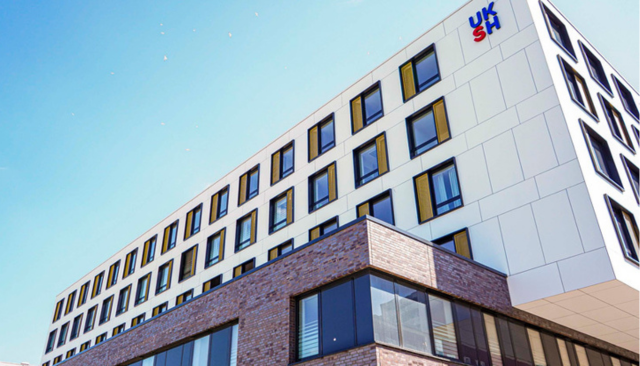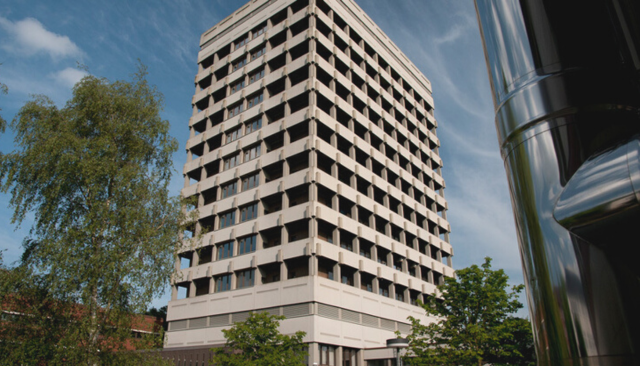Universities & Research Centres
The four Kiel universities together educate around 34,000 students and, together with other research institutions, make Kiel an important science location.
Kiel University (CAU)
As the only comprehensive university in Schleswig-Holstein with more than 27,000 students and numerous scientists, Christian-Albrechts-Universität zu Kiel (CAU) offers an interdisciplinary academic environment with over 200 degree programmes in eight faculties. Through research, teaching and knowledge transfer, the Kiel University contributes to solving the great challenges of our time.
Go to page of the Kiel University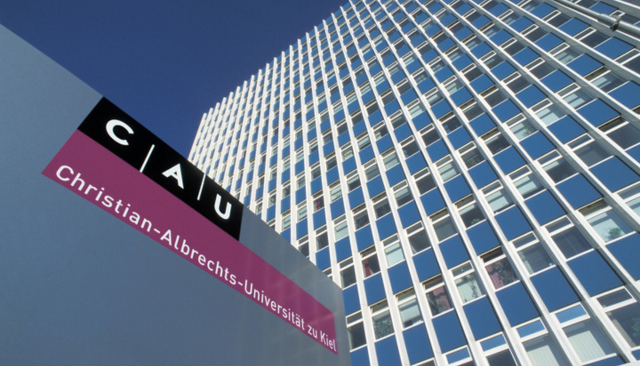
Studium und Lehre
Die Kieler Universität bietet mit 190 Studiengängen viele Möglichkeiten, das Studium individuell zu gestalten. Neben klassischen Studienfächern wie Jura und Medizin stehen Fachrichtungen der Geistes-, Gesellschafts- und Naturwissenschaften zur Wahl. Angewandte Studienrichtungen wie die Materialwissenschaften und technologische Fachgebiete oder die Agrar- und Ernährungswissenschaften bieten beste Berufsoptionen. Typisch für Kiel sind frühe Einblicke in die aktuelle Forschung und fachliche Grundlagen für eine Zusammenarbeit in interdisziplinären Teams.
Forschung
Die CAU hat vier Forschungsschwerpunkte: Lebenswissenschaften, Meereswissenschaften, Nanowissenschaften und Oberflächenforschung sowie Gesellschaft, Umwelt, Kultur im Wandel. Jeder Schwerpunkt bündelt die Expertisen verschiedener Fakultäten aus den Natur-, Sozial-, Technik-, Rechts- und Geisteswissenschaften. Die Forschungsschwerpunkte die Grundlage für die Exzellenzcluster „Precision Medicine in Chronic Inflammation“ und „ROOTS – Konnektivität von Gesellschaft, Umwelt und Kultur in vergangenen Welten“ .
Kiel University of Applied Sciences (UAS)
Knowledge transfer with a strong practical orientation - this is what Kiel UAS has stood for for more than 50 years. In more than 40 Bachelor's and Master's degree programmes at the six faculties of Agriculture, Computer Science and Electrical Engineering, Mechanical Engineering, Media/ Civil Engineering, Social Work and Health, around 8,000 students are dedicated to current technical, economic, social and creative challenges.
Go to page of the UAS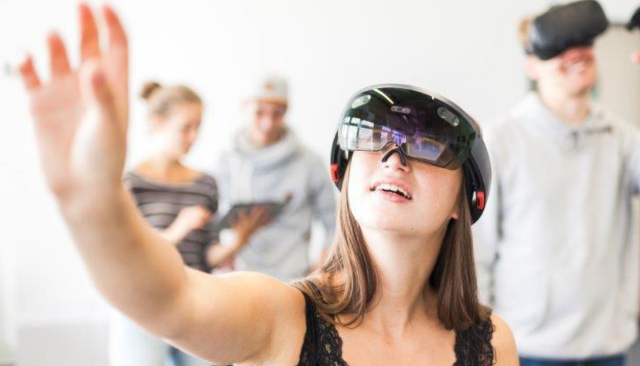
Forschen für die Praxis
Forschungsschwerpunkte sind unter anderem Windenergie und Biomassenutzung, Schiffbau, Nanotechnologie, Elektromobilität sowie Grundlagenforschung im Bereich der Sozialen Arbeit und Gesundheit.
Motorsportbegeisterte Studierende konstruieren und bauen einen Rennwagen für die Formula Student, die CampusRedaktion veröffentlicht zweimal jährlich das Hochschulmagazin „viel.“ und eine Gruppe Studierender vom Fachbereich Medien setzt für Campus TV wichtige und interessante Ereignisse ins rechte Bild.
Standort mit Geschichte
Der Campus der Fachhochschule Kiel ist außergewöhnlich. Wer mag, fährt mit der Fähre zur Vorlesung und die Mensa ist in einer ehemaligen Bootshalle untergebracht. HDW baute auf dem Gelände einst Schiffe, Rudolf Hell erfand hier das Fax-Gerät und Albert Einstein legte zu gemeinsamen Segeltörns mit dem Erfinder des Kreiselkompasses Herrmann Anschütz-Kaempfe ab.
Die Hochschule bezieht Baudenkmäler in die Entwicklung des Campus ein. Studierende und Ehrenamtliche haben einen Werkluftschutzbunker zum Kultur- und Kommunikationszentrum Bunker-D ausgebaut. Ein Personenschutzbunker beherbergt seit 2011 das Computermuseum der FH Kiel. Das Angebot des Mediendoms lockt Jahr für Jahr Tausende von Gästen unter seine Kuppel.
Muthesius University of Fine Arts and Design
The Muthesius Academy of Fine Arts offers Bachelor's, Master's and doctoral programmes in the fields of art, spatial strategies and design. Semester sizes of 15 to 20 students enable a project-oriented and practical education in which students can be individually supported.
Students from over 30 countries around the world come together in Kiel to study art.
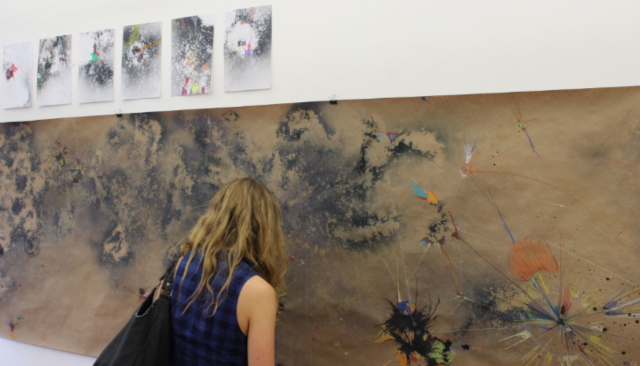
Muthesius Netzwerk
Die interdisziplinäre Studienstruktur, das Muthesius Netzwerk, verknüpft alle Studienbereiche der Hochschule und bietet eine Vielfalt von Lehrangeboten. Traditionelle Bereiche des künstlerisch-gestalterischen Arbeitens und die Neuen Medien spielen dabei eine grundlegende Rolle.
Das Studium ist eine Mischung aus Theorie, Handwerk und Schulung von Wahrnehmung und Sensibilität. Unterschiedliche Materialien, Medien und Darstellungsformen werden auf ihre Leistungsfähigkeit und ihre Grenzen erforscht. Hinzu kommen Angebote der Theorie und des Zentrums für Medien.
Werkstätten und Kooperationen
Die Muthesius Kunsthochschule gehört zu den am besten ausgestatteten Kunsthochschulen. Die Werkstätten für Siebdruck, Buchbinden, Druck, Satz, Fotografie, Video, Keramische Plastik, Bildhauerei, Modellbau begleiten die Arbeiten praxisgerecht.
Die Fachbibliothek, eine Diathek und das EDV-Zentrum stehen allen Studierenden und Interessierten offen. Die Hochschule kooperiert eng mit vielen Kultureinrichtungen der Region, ist international ausgerichtet und pflegt intensive Beziehungen zu zahlreichen europäischen Partnerhochschulen.
University of Applied Sciences (DHSH)
The Duale Hochschule Schleswig-Holstein (DHSH) trains future business economists and business IT specialists in Kiel, Lübeck and Flensburg in close cooperation with companies. Options also include a dual study program in social work and part-time master's degree courses.
At the DHSH, students can combine training and studies and thus apply what they have learned and earn their own money right from the start.
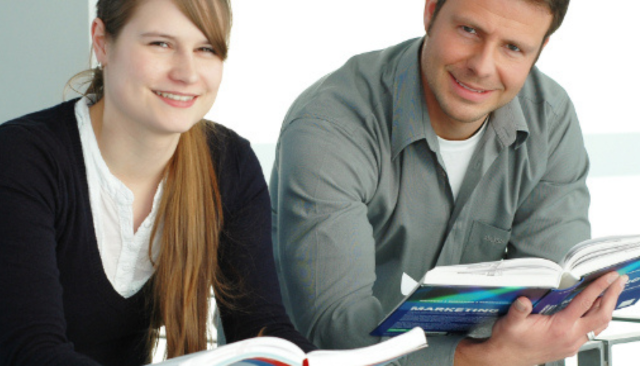
Berufsnah studieren
Das Modell des dualen Studiums hat die Hochschule von der Berufsakademie der Wirtschaftsakademie Schleswig-Holstein übernommen und führt es als Hochschule für angewandte Wissenschaften seit 2018 in Trägerschaft der Wirtschaftsakademie Schleswig-Holstein fort.
Das auf sechs Semester angelegte Studium ist mit betrieblichen Praxiseinheiten im Wechsel eng verzahnt.
Praxisnah & Wissenschaftsorientiert
Das theoretische Wissen liefert die Hochschule, den praktischen Teil ein Unternehmen. Das Studium ist dadurch zugleich wissenschaftsorientiert sowie praxisnah und schafft für Absolvent*innen mit Allgemeiner Hochschulreife oder Fachhochschulreife hervorragende Perspektiven, um Führungsaufgaben in der Wirtschaft zu übernehmen. Die Studiengänge Betriebswirtschaft und Wirtschaftsinformatik sind von der FIBAA erfolgreich akkreditiert und werden mit dem Bachelor-Grad abgeschlossen.
Other Kiel research centres
GEOMAR Helmholtz Centre for Ocean Research Kiel
The GEOMAR Helmholtz Centre for Ocean Research Kiel is one of the world's leading institutions in the field of marine research. The institute's task is to study the chemical, physical, biological and geological processes in the ocean and their interaction with the seabed and the atmosphere.
The research foci are grouped into four central areas:
- Ocean Circulation and Climate Dynamics,
- Marine Biogeochemistry,
- Marine Ecology,
- Dynamics of the ocean floor
Kiel Institute for the World Economy
The Kiel Institute for the World Economy is one of the major centres of global economic research, economic policy advice and economic education. The Institute sees its main task in researching innovative approaches to solving urgent global economic problems. It advises decision-makers in politics, business and society and informs the public about important economic policy issues.
As a gateway to global economic research, it maintains a broad network of national and international experts whose research work is directly or indirectly incorporated into the IfW's research and advisory activities.
ZBW – Leibniz Information Centre for Economics
The ZBW - Leibniz Information Centre for Economics is the world's largest information infrastructure for economics. The facility houses around four million media units and provides access to millions of economic online documents. In 2019, the ZBW celebrated its 100th birthday. In 2020 alone, more than 12.3 million digital full texts were downloaded.
It has received the international LIBER Award several times for its innovative library work. In 2014, the ZBW was named "Library of the Year".
IPN - Leibniz Institute for Science and Mathematics Education
The IPN - Leibniz Institute for Science and Mathematics Education conducts fundamental and application-oriented research on questions of learning and teaching science and mathematics inside and outside schools. The Institute's mission is to further develop and promote science and mathematics education through its research.
The IPN is currently divided into six departments: Educational Science, Pedagogical-Psychological Methodology, Didactics of Biology, Didactics of Chemistry, Didactics of Physics and Didactics of Mathematics.
University Hospital Schleswig-Holstein (UKSH)
The University Hospital Schleswig-Holstein (UKSH) with its locations in Kiel and Lübeck is one of the largest European centres for medical care. As the only maximum care hospital in Schleswig-Holstein, UKSH covers the entire spectrum of modern medicine and is one of the most important employers and educators in the state.
UKSH offers students teaching in human medicine and dentistry that is of a high quality compared to the rest of Germany. The researchers cooperate with universities all over the world and demonstrate their recognised expertise in large-scale studies. The results range from the discovery of new molecular complexes to recommendations for dealing with the health risks and diseases of the 21st century.
Max Rubner Institute
The Max Rubner Institute is the federal government's research and advisory institution in the field of nutrition and food. The work of the Max Rubner Institute contributes to expanding scientific knowledge about the quality, authenticity and safety of food, the health effects of food and its ingredients, and nutritional behaviour. In this way, the Institute makes an important contribution to consumer health protection.
Only a surprisingly few people knew Max Rubner ten years ago, who, as the successor to Robert Koch at the Charité, created knowledge that is still fundamental today. For example, with his research on the energy content of food, he laid the foundation for the calorie tables that are now an indispensable part of most people's lives.



